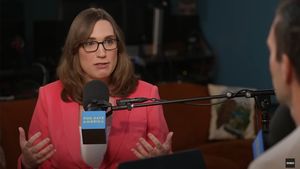Corey O'Brien is a professional dancer, content creator, and recovering alcoholic. He has performed with artists such as P.Diddy, French Montana, Nas, Ne-Yo, Iggy Azalea, and more and has appeared on shows like MTV's Beyond Dance andRuPaul's Drag Race. In this extremely personal op-ed, he shares his experience from the darkest moments of his life to what eventually drove him to seek the help he needed. Corey will premiere a new weekly livestream series, Isolated in Sobriety, on his Instagram page on Wednesday, April 15th for those needing community aid in their recovery during social distancing.
Maybe it was having zero friends of the same gender growing up or the names yelled at me everywhere I went wearing my sister's dresses and carrying around her Barbie dolls. Perhaps it was the constant questions of "why do you sound like a girl?" or the blatant laughs on the school bus. Whatever it was, before I could even recognize it, at a young age I became engulfed in a feeling of suffocation, caused by a mix of isolation, embarrassment, and discomfort in my own skin. This was shame -- a product of some of my first memories as a child.
As a teenager, as the name-calling, harassment, bullying, and use of homophobic slurs towards me only got worse, I began to find a coping mechanism. I found solace in something that made my embarrassment subside, my isolation comforting, and my skin a bit cozier: drugs and alcohol.
Trending stories
Tasting alcohol for the first time was like tasting freedom. I was taking double shots of vodka at thirteen years old and the burning sensation, while repulsive to others, was a comforting and safe embrace to me. Each sip chipped away at my fears and insecurities. Depression faded away and a euphoric feeling took hold. It was a feeling I never wanted to let go.
My substance abuse escalated and the form no longer mattered: liquids, powders, pills, I embraced them all. I never just experimented, I always took it to the extreme. How could finally feeling joy be wrong?
My addictions would eventually become major obstacles to my dreams. I graduated high school with multiple dance scholarships and was on track to attend university as a dance major. But my addictions and fear of failing caused me to give up before I even began. I stayed at home in Pennsylvania for months paralyzed by self loathing and regret. I eventually moved to New York City and enrolled in a dance program. There, I spent most of my days drinking wine and continued this pattern as my career went international.
One of my jobs, performing on a cruise ship in the middle of the ocean, a paradise for many, proved to be the first, but not the last time, I would be fired from because of my using.
On a new job in Brazil, I became the "party boy" as I ran from my panic, depression, anxiety, and embarrassment again. When we returned to New York to begin rehearsals for our next tour, I felt like I wasn't a person. I pushed my feelings and emotions down so far that the hole inside me felt bottomless. One day on the way to rehearsal, I couldn't bring myself to go in. I walked right past and kept walking. I was in a trance, faintly hearing cars and conversations around me. I didn't have a cell phone, I had traded it for a high. I was able to get in touch with my Dad and told him I had to come home.
Once I returned to Pennsylvania, I began therapy. Still, I continued using, thinking that if I was going to therapy, I must be getting better. After a few months, I decided to go back to New York. The first audition I went on, I booked. I felt like I was getting my career back, surely my problems wouldn't pack up and follow me now.
Two months later, I remember waking up and stumbling to the bathroom one day, looking into the mirror and seeing open cuts all over my face and vomit on my shirt. There it was again, a mix of isolation, embarrassment, discomfort in my own skin, and crippling shame. It never left, maybe I was too numb to realize it. At that moment, I did not care what happened to me.
I was sent home. Fired, again.
I thought alcohol would bring me confidence, but it stole it. I hoped drugs would bring me true friendships, but they ruined the ones I had. No substance brought me peace. What had happened?
My family sent me to rehab for what was meant to be 30 days -- that stay ended up lasting 334 days. There I was brought face-to-face with my demons, engaged in therapy sessions and Alcoholics Anonymous meetings. Through connecting with others, I became vulnerable, something I had previously avoided. I even began to journal. I would have never imagined how important journaling would become for me. I would bring my journal to every single group and write down something that I could apply to my life. I learned that insecurities weren't facts, secrets keep you sick and that fear had two meanings - forget everything and run or face everything and rise. It was my choice to decide how I wanted to live my life, and with the help of my therapists, l chose to face my issues head-on.
Rehab taught me that my way of living was linked to my self-image. I learned that confidence came from within me and not from a liquor bottle. I became aware that many of us began using because we never felt a sense of belonging. I learned that forgiveness was a huge key to moving forward, not just when it came to others but also myself. I had to forgive those who wronged me or things that happened to me in the past without hearing, "I'm sorry," and I had to be more gracious with myself. I changed my way of thinking - instead of always expecting the worst to happen, I thought about what good could come out of a situation. I had to train my mind to stay in the present and not worry about the future, constantly worrying about possibilities like relapses, bad relationships, lost jobs, etc., makes sobriety almost impossible.
For years, I had hurt myself. Whether the drugs and alcohol I put in my body or my negative thoughts, I was breaking myself down every chance I got. In rehab, I started feeling acceptance and gratitude. For once it wasn't shame overwhelming me, but love.
When I completed rehab, I felt ready to pursue my dance dreams. I had an opportunity for a dance TV show in Los Angeles and finally, I felt like I was running towards something instead of away. Many people had their doubts, but I was fueled by something that wasn't a substance, it was a desire to succeed.
Today I have seven years of sobriety. No relapses, no faltering, and never again giving up on myself.
I have not overcome addiction, addiction is not something you overcome. It's something you fight for, something you change your whole life for and something you choose to work for every single day. What we can overcome is the fear of speaking up and sharing our truth. There should be no shame in sobriety or even our setbacks. There are moments you thought you'd never live without drugs or alcohol, moments you didn't even want to live without, but now you are. You're living, you're thriving and that should be celebrated.
Given the current state of the world, social distancing is imperative. Nevertheless, isolation is something that drives many addicts/alcoholics to dangerous places not only in their addiction but in their minds. While limiting contact and human interactions, many of those who find solace and community in their weekly, even daily, meetings are at a loss. Stability is something that many were searching for when they first got sober. Major shifts for someone battling with addiction can be terrifying and life-threatening.
Navigating sobriety is challenging, and among current times, sobriety might even feel impossible. Sharing brings us all together. Support groups for myself and many others have been extremely beneficial when it comes to seeking advice, following a program that works and feeling a sense of community. I want to share beyond this letter and bring the community together in a way that is both beneficial to their journey of sobriety and safe for them and their loved ones.
Isolated in Sobriety is a new weekly livestream on my Instagram, that will launch April 15th. Every Wednesday we will come together as a community so that no one feels alone, especially if they are fighting against addiction.
Addiction does not discriminate, it can affect your family, boss, coach, or an idol you look up to. It has a way of latching onto someone and taking control. We don't have to fight shame alone. Do not feel shameful asking for help with your addiction, it is the most courageous act of all. We don't have to battle addiction in silence. We don't have to celebrate our sobriety behind closed doors.
We all deserve love and support, no matter where we are in our journey.

























































































I Found My Sobriety Through Community, So I'm Bringing That Online
Dancer Corey O'Brien, known to some as the boyfriend of NFL free agent Ryan Russell, tells the story of how he became sober.
Corey O'Brien